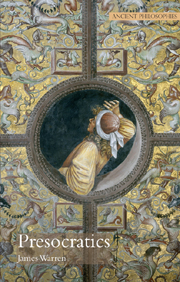Book contents
- Frontmatter
- Contents
- Acknowledgements
- Sources and abbreviations
- Chronology
- Map of the ancient Mediterranean
- 1 Introduction: reading Presocratic philosophy
- 2 Ionian beginnings
- 3 Xenophanes
- 4 The oracles of Heraclitus
- 5 Parmenides
- 6 Reactions to Parmenides
- 7 Anaxagoras
- 8 Empedocles
- 9 Democritus and Leucippus
- 10 Epilogue
- Guide to further reading
- Notes
- Bibliography
- Index of passages
- Index
6 - Reactions to Parmenides
- Frontmatter
- Contents
- Acknowledgements
- Sources and abbreviations
- Chronology
- Map of the ancient Mediterranean
- 1 Introduction: reading Presocratic philosophy
- 2 Ionian beginnings
- 3 Xenophanes
- 4 The oracles of Heraclitus
- 5 Parmenides
- 6 Reactions to Parmenides
- 7 Anaxagoras
- 8 Empedocles
- 9 Democritus and Leucippus
- 10 Epilogue
- Guide to further reading
- Notes
- Bibliography
- Index of passages
- Index
Summary
However influential or powerful we imagine the arguments of Parmenides to have been, they were certainly not successful in discouraging entirely the practice of cosmological speculation. Indeed, if Parmenides had intended to put an end to all such accounts of the origin and composition of the cosmos, then he would surely have been very disappointed by the response to his arguments. The period after Parmenides saw no diminution in attempts to explain the universe and the processes of change and generation within it, although perhaps Parmenides would have been pleased to see that those attempts tended to be more self-conscious and precise in their claims about which things “are”, which things are fundamental to the universe and how these fundamental things compose everything else. It is also worth noticing that Parmenides had himself, arguably, already led the way by producing the first post-Parmenidean cosmology in his own “Way of Opinion”.
Parmenides' supporters: Zeno and Melissus
Before we turn to those philosophers who seem to have been influenced by Parmenides and tried to find a way to return to cosmological system-building, we can look briefly at two philosophers who were inspired by Parmenides to write in support of his general project. The three together – Parmenides, Zeno and Melissus – are sometimes described as the “Eleatic” school, although Melissus was not in fact from Elea but from Samos, an island at the opposite end of the Greek world.
- Type
- Chapter
- Information
- Presocratics , pp. 103 - 118Publisher: Acumen PublishingPrint publication year: 2007



